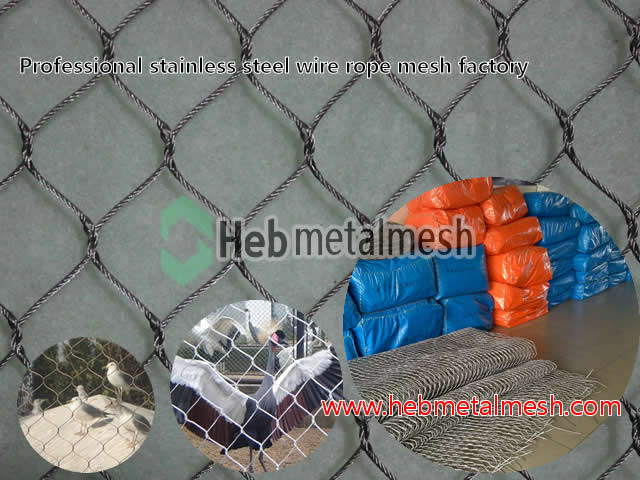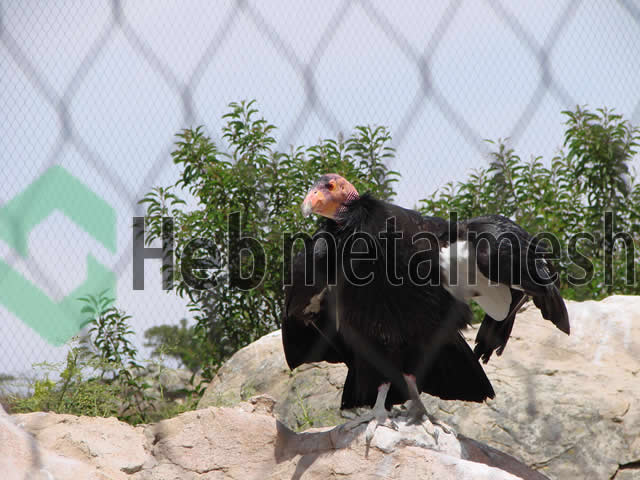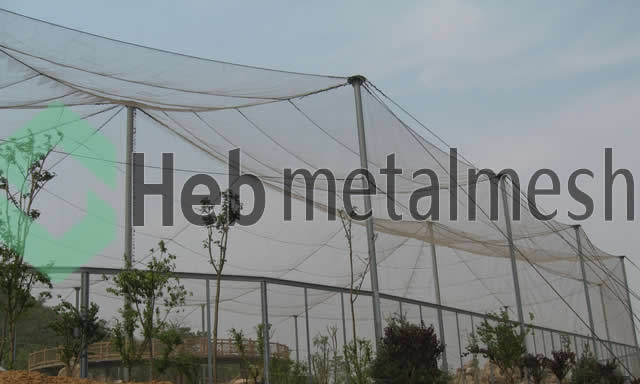Introduction to Aviary Mesh Panels
Aviary mesh panels are integral components in the construction of bird enclosures, providing both safety and comfort for avian inhabitants. These panels serve as barriers that protect birds from external threats while allowing for ventilation and visibility. The significance of aviary mesh panels cannot be overstated, as they are essential for creating secure environments where birds can thrive without the risk of escape or predation.
Available in various materials, aviary mesh panels cater to different needs and requirements. Commonly used materials include galvanized steel, aluminum, and PVC-coated wire. Each type of material possesses its own unique benefits, such as durability, resistance to corrosion, and ease of maintenance. Steel panels are particularly robust, making them suitable for larger and more active bird species, while lighter panels may be adequate for smaller or less aggressive birds. The selection of the appropriate material will depend on factors such as the species of bird, enclosure size, and environmental conditions.
In addition to varying materials, aviary mesh panels come in different mesh sizes, which are crucial for ensuring that birds remain safely inside their enclosures. Smaller mesh sizes can prevent small birds from escaping and protect them from predators, whereas larger openings can facilitate better airflow and visibility for the birds. It is important to choose a mesh size that balances safety with the well-being of the birds, allowing them to engage with their surroundings while minimizing risks.
Overall, understanding the diverse options available for aviary mesh panels is essential for anyone looking to create a suitable habitat for birds. The right selection not only enhances the aesthetic appeal of the enclosure but also plays a pivotal role in ensuring the safety and happiness of the birds within.
Understanding Aviary Mesh: Types and Materials
Aviary mesh panels serve a critical role in the safety and comfort of birds in enclosed environments. To ensure the welfare of avian inhabitants, selecting the right materials for these panels is paramount. Heavy-duty options are particularly favored for larger enclosures, providing the necessary strength and durability to withstand various environmental factors while protecting birds from potential predators.
One of the most popular materials for aviary mesh panels is stainless steel. Known for its exceptional durability and corrosion resistance, stainless steel is ideal for outdoor aviaries exposed to rain, sunlight, and humidity. This material is less likely to rust compared to other metals, ensuring a longer lifespan for the mesh. However, stainless steel can be more expensive than alternatives, which may be a consideration for budget-conscious avian enthusiasts.
Nylon is another commonly used material for aviary mesh panels, particularly in smaller aviaries. This synthetic option is lightweight, flexible, and resistant to UV rays, reducing degradation from sunlight exposure. Additionally, nylon mesh is typically more affordable than stainless steel. However, while it offers good protection, nylon panels may not withstand larger birds’ beaks or claws as effectively as heavy-duty options made from metal.
Plastic is yet another option for aviary mesh panels, particularly useful in situations where flexibility is required. Plastic mesh is often less expensive and can be easily cut to size. However, its strength and durability may not match those of stainless steel or reinforced nylon, making it less suitable for larger birds or aggressive species. When choosing aviary mesh, it is essential to consider the specific needs of the birds and the environmental conditions they will be exposed to. Overall, heavy-duty aviary mesh panels made from stainless steel are often the most reliable choice for ensuring the safety and security of birds in larger enclosures.
Factors to Consider When Choosing Aviary Mesh
When selecting aviary mesh panels, various factors must be taken into account to ensure the well-being of the bird species being housed. The type of bird is paramount, as different species have distinct needs. For instance, small birds such as finches or canaries may require finer mesh to prevent escape, while larger birds like parrots will necessitate sturdier, more robust panels to withstand tampering and potential damage.
The size of the aviary itself plays a crucial role in determining the appropriate mesh type and panel configuration. A larger aviary might require panels that not only offer adequate strength but also ensure proper airflow and visibility. It is vital to maintain a comfortable living environment for the birds, and using the right aviary mesh is vital in achieving that balance. Additionally, the shape of the aviary—whether it is square, rectangular, or circular—can influence the selection of materials and sizes of the mesh panels.
Environmental conditions are another critical consideration. If the aviary is placed outdoors, the mesh must be durable enough to withstand elements such as wind, rain, and ultraviolet radiation. In contrast, a mesh panel used in an indoor setting could prioritize aesthetics while still providing necessary security and ventilation. Weather-resistant options may be necessary for outdoor use, while softer and lighter materials can be suitable for indoor environments.
Lastly, safety requirements must not be overlooked. The chosen aviary mesh panels should prevent predators or outside dangers from entering the birds’ space. Ensuring that the mesh is securely fitted and appropriate for the specific needs of the aviary is essential for safeguarding the birds’ health and safety. Prioritizing these factors will lead to a better decision when selecting the most appropriate aviary mesh for your feathered friends.
What Mesh Should I Use for an Aviary?
Selecting the appropriate mesh for an aviary is a critical decision that can significantly impact the safety and well-being of your avian companions. Aviary mesh panels come in various materials, each with its own set of attributes suitable for different applications. When designing an aviary, it is crucial to consider the environment in which your birds will reside, as well as their size and species, to determine the most effective mesh solution.
Heavy-duty aviary mesh panels are often recommended for outdoor enclosures. These panels are typically constructed from durable materials such as stainless steel or galvanized aluminum, which provide strong resistance against weather elements and potential predators. The choice of a robust mesh is particularly important for larger birds. For instance, birds like parrots and macaws require a higher gauge wire to prevent escape or injury, whereas smaller species may be accommodated with lighter options but should still ensure safety from external threats.
Another factor to consider is the mesh size. A mesh aperture that is too large might allow smaller birds to escape or become vulnerable to predators. Conversely, very small mesh may cause health issues, as it can restrict airflow or hinder natural light penetration, both of which are essential for your birds’ health. As a general guideline, a mesh opening of 1 inch or less is recommended for larger birds, while smaller species may require a mesh with openings no larger than ½ inch.
Ultimately, the choice of aviary mesh panels should reflect a balance between durability, safety, and comfort for your avian residents. Ensuring that your aviary is equipped with the right type of mesh will create a secure environment that promotes the health and happiness of your birds.
The Strongest Aviary Netting Solutions
When constructing aviaries, the selection of netting is imperative in ensuring the safety and well-being of the birds housed within. Among the myriad aviary mesh panels available, heavy-duty options stand out due to their unparalleled strength and resilience. One of the most robust solutions in this category is stainless steel rope mesh. This material is engineered to withstand significant pressure, making it less susceptible to wear and tear over time compared to other options.
Stainless steel rope mesh is constructed from high-quality stainless steel, which not only provides remarkable strength but also boasts excellent corrosion resistance. This feature is particularly beneficial in outdoor aviaries, as it can withstand the elements without deterioration. The durability of stainless steel mesh comes from the way the ropes are woven together, forming a sturdy barrier that can protect birds from potential predators while allowing adequate ventilation and visibility.
Another popular heavy-duty option is polyethylene aviary mesh. While it is less robust than stainless steel, it is still favored due to its lightweight properties and UV resistance. This type of netting is often easier to install, which can be a significant advantage for DIY enthusiasts. However, the trade-off is a shorter lifespan and lower strength, making it less suitable for larger or more aggressive bird species.
For those seeking a balance between strength and ease of use, high-tensile wire mesh panels may present an ideal solution. These panels combine both strength and flexibility, providing a durable enclosure that can adapt to various aviary sizes and shapes.
Ultimately, choosing the right material for aviary mesh panels hinges on the specific needs of the birds, the intended installation environment, and the level of protection required. Stainless steel rope mesh emerges as a standout due to its exceptional strength, durability, and safety features, making it a premier choice for aviary applications.
Choosing the Right Size of Aviary Mesh for Your Birds
Selecting the appropriate size of aviary mesh panels is critical for the well-being of your birds, particularly when catering to specific species. Finches, for example, are small, active birds that require a mesh size allowing for adequate movement while ensuring their safety. The general recommendation for finches is to use a mesh with openings no larger than 1/2 inch. This dimension is ideal to prevent them from escaping or getting caught, while still allowing for airflow and visibility.
For larger birds, the mesh size should vary accordingly. Cockatiels, for instance, can typically thrive with a mesh that features openings of about 1 inch. This size provides the necessary balance between providing a secure environment and allowing for comfortable movement within the aviary. However, it is imperative to consider the specific species as well as their individual behaviors; the more active the bird, the more securely they need to be housed.
When contemplating the specific type of aviary mesh panels to use, it is also essential to think about the material. Stainless steel or galvanized wire are excellent choices as they are both durable and resistant to the environmental elements. Regardless of the size of the mesh openings, the construction material plays an equally crucial role in ensuring longevity and safety for the birds.
Furthermore, providing the right size aviary mesh is not solely about preventing escapes; it also plays a role in the birds’ social interactions and overall comfort. Finches, for example, thrive in environments that mimic their natural habitat. By using the appropriately sized aviary mesh, you can ensure your birds remain secure while promoting their health and well-being.
Where to Buy Aviary Mesh Panels
When it comes to purchasing aviary mesh panels, bird enthusiasts and owners have a variety of options available to them. The decision of where to acquire these essential materials often depends on accessibility, cost, and quality. Both online retailers and local suppliers offer a range of products suitable for constructing or enhancing aviaries. Online shopping has become increasingly popular due to the convenience it provides. Websites specializing in pet supplies or garden materials frequently carry high-quality aviary mesh panels. Platforms such as Amazon, eBay, and specialized pet supply websites often feature multiple brands and variations, allowing buyers to compare prices and read customer reviews, which can be particularly beneficial in evaluating durability and functionality.
On the other hand, local suppliers can offer the advantage of immediacy; purchasing aviary mesh panels from a nearby hardware store or garden center allows customers to physically inspect the materials before buying. Additionally, many local suppliers are willing to provide custom solutions tailored to individual needs, which can be an essential service for building unique aviaries. Searching for “aviary mesh panels near me” on search engines or mapping services can yield useful results, directing bird owners to suppliers in their vicinity. It is recommended to call ahead to confirm the availability of specific products, as stock levels may vary.
In your quest to secure aviary mesh panels, it may also be worth exploring local bird clubs or forums. These communities often have discussions and recommendations on where to purchase quality materials. Fellow bird owners can provide insights on their best experiences, potentially guiding you to reputable suppliers. By weighing both online and local purchasing options, you can ensure you obtain high-quality aviary mesh panels that meet the needs of your birds effectively.
Benefits of Using Stainless Steel Rope Mesh
When it comes to constructing aviaries, the choice of materials can significantly impact the safety and well-being of birds. One of the most effective materials for aviary mesh panels is stainless steel rope mesh, which offers numerous advantages over other options. The durability of stainless steel makes it resistant to physical wear and tear, ensuring that it can withstand the challenges posed by various environmental conditions.
Stainless steel rope mesh panels are specifically designed to resist rust and corrosion, which is a crucial factor considering the exposure to rain and humidity in outdoor settings. This resistance ensures that the aviary remains stable and functional for years, requiring minimal maintenance. Additionally, the strength of stainless steel provides robust protection against potential predators, creating a secure environment for avian inhabitants. The tightly woven design of the mesh means that small predators are effectively kept at bay, ensuring the safety of birds of all sizes.
Another significant benefit of using stainless steel rope mesh is its versatility in design and installation. The panels can be easily customized to fit various shapes and sizes, allowing for creative aviary layouts that enhance the birds’ living conditions. Moreover, these panels allow natural light and air to flow freely, contributing to the overall health and well-being of the birds inside. By integrating aesthetic appeal with functionality, stainless steel rope mesh provides a holistic solution for anyone looking to build an aviary.
In light of these advantages, it is evident that utilizing stainless steel rope mesh for aviary mesh panels is a wise decision that meets both durability and security needs. The combination of strength, low maintenance, and design flexibility makes stainless steel the preferred choice for crafting safe and attractive aviaries.
Conclusion: Making the Right Choice for Your Aviary
Choosing the proper aviary mesh panels is a critical decision that can significantly impact the well-being and safety of your birds. Throughout this discussion, we have examined the essential characteristics of high-quality aviary mesh panels, including their durability, material strength, and effectiveness in providing a secure environment for avian inhabitants. Selecting heavy-duty options ensures not only protection against predators but also resilience against wear and tear over time.
It is important to consider the specific needs of your birds when selecting the appropriate mesh panels. Different bird species have varying requirements regarding space, safety, and environmental conditions, which should guide your choice. For example, larger birds may require sturdier panels that can withstand their natural behaviors, whereas smaller species might thrive in lighter mesh that allows for better visibility and airflow.
Moreover, the installation process and long-term maintenance should not be overlooked. When selecting aviary mesh panels, consider those that are easy to install and require minimal upkeep. This can save time and resources, allowing you to focus more on the care and enjoyment of your feathered friends rather than repairs or replacements.
Ultimately, investing in the right aviary mesh panels is an investment in the health and happiness of your birds. By carefully evaluating options based on their attributes, compatibility with your aviary’s design, and the specific needs of your avian companions, you can create a safe and comfortable habitat. The careful selection of high-quality aviary mesh panels will not only enhance their living environment but also ensure their wellbeing for years to come.


